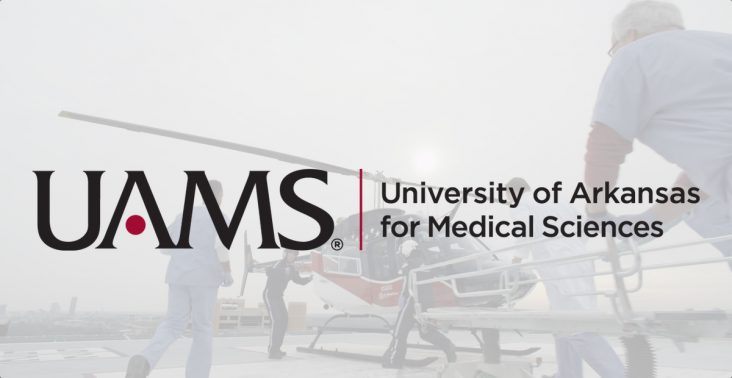UAMS modeling has deaths at almost 1,700 by Oct. 15; state reports antigen testing results
by September 2, 2020 3:24 pm 1,460 views

Modeling from the University of Arkansas for Medical Sciences that has been close to actual numbers predicts COVID-19 deaths in the state will reach 1,688 by Oct. 15, with cumulative case numbers rising to 115,000 by that same date.
The modeling, updated Tuesday (Sept. 1), predicts 63,444 cumulative cases by Sept. 7, but the real case count is likely to surpass that estimate. Cumulative cases as of Sept. 2 were 62,112. The modeling also predicted 803 deaths by Sept. 7, but the state has reported 841 deaths as of Sept. 2.
The modeling previously predicted 4,159 cumulative hospitalizations on Aug. 24, and the actual number was 4,028. The modeling also predicted cumulative intensive care admissions of 1,447 on Aug. 24, and the actual number of patients in intensive care was 1,454.
Long-term modeling suggests there will be 78,888 active COVID cases in Arkansas by Dec. 26, with 1,972 hospitalized because of COVID, 788 in ICU and 315 on ventilators.
“The simulations also suggest the number of daily infections will be significantly lower if schools provide online instruction only. Daily new infections are expected to be higher if schools provide in-person classes only,” the report noted.
Gov. Asa Hutchinson has largely been dismissive of the UAMS modeling, saying the reports are “not helpful,” and “ignores the reality” that education is better for all involved with in-class instruction.
COVID CASE UPDATE, ANTIGEN TESTING
Known COVID-19 cases in Arkansas totaled 62,112 on Wednesday, up from 61,497 on Tuesday, with 4,773 test results from the previous 24 hours. Of the 615 new cases, 16 were from correctional facilities. There are 5,010 active cases.
The number of deaths rose from 814 to 841. Of the 27 new deaths, 13 were from more than three weeks ago. The number of COVID patients hospitalized in Arkansas was 435 on Wednesday, up from 423 on Tuesday. There are 90 patients on ventilators, up from 85 on Tuesday. There are 58,261 cumulative recovered cases.
The top five counties with new known cases were: Washington (67), Pulaski (62), Benton (60), Craighead (49), and Garland (26). The counties accounted for 44.1% of the 599 new community cases.
As of Wednesday at 1 p.m., there were 6,092,175 U.S. cases and 185,123 deaths. Globally, there were 25,816,820 cases and 858,381 deaths.
There have been 13,098 antigen tests conducted in Arkansas as of Sept. 2, with 2,050 being positive for a positivity rate of 15.7%. According to Dr. Jennifer Dillaha, director of medical immunizations with the Arkansas Department of Health, an antigen positive is a “probable case” because it has not yet been verified by a polymerase chain reaction (PCR) test. Antigen tests are not as reliable as PCR tests, but provide on-site results, whereas PCR tests must be processed by a lab.
Antigen positive results are not counted in the state’s number of known COVID cases. However, Dillaha said the ADH treats positive antigen tests as a confirmed case in terms of contact tracing and other measures taken with those who have a positive PCR test.
FEDERAL MONEY, SCHOOL FOOD SUPPORT
Gov. Hutchinson said Wednesday (Sept. 2) during his daily COVID briefing that Congress must act soon on a new federal package to help states respond to the ongoing pandemic. Earlier this year Congress passed the Coronavirus Aid, Relief, and Economic Security (CARES) Act to provide aid to individuals, businesses and state and local governments in response to the pandemic. Arkansas received $1.25 billion in that legislation.
The governor said Congress needs to give states greater flexibility in spending existing CARES Act money and extend the deadline to spend the money beyond Dec. 31.
“That will allow us to invest more in high-speed broadband in our rural communities. It will allow us to make sure we have enough money set aside for vaccine distribution. But we need that flexibility,” Gov. Hutchinson said.
He also said the state needs more money for education because costs are higher as schools adapt to combinations of in-class and virtual learning.
Arkansas Secretary of Education Johnny Key also reported that Arkansas is participating in a U.S. Department of Agriculture program that allows schools to serve meals to all students at no cost. Key said in the spring, 89% of districts provided meals to students in school and at home. He said the federal program will provide the state $80 million through December.
